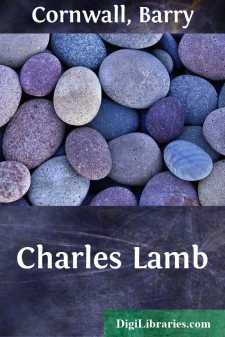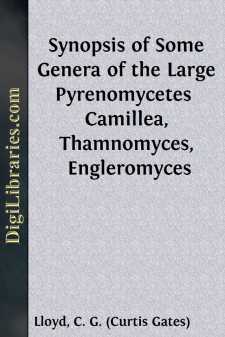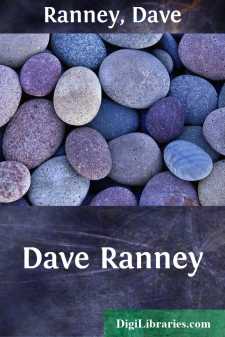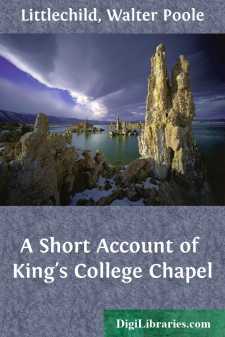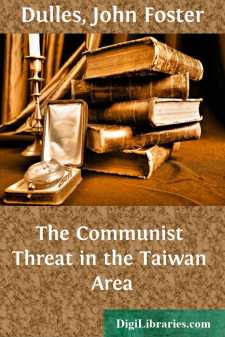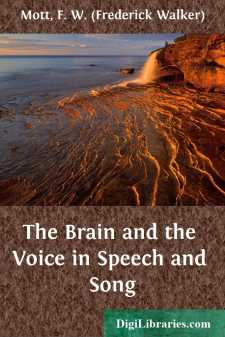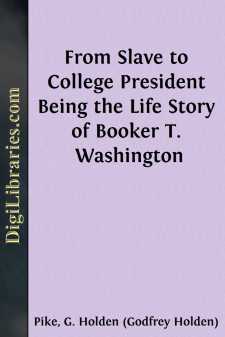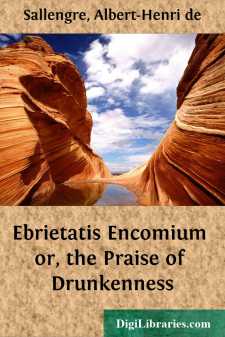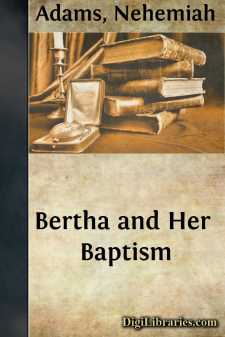Non-Classifiable
- Non-Classifiable 1768
Non-Classifiable Books
Sort by:
‘We cordially recommend Mr. Ritchie’s book to all who wish to pass an agreeable hour and to learn something of the outward actions and inner life of their predecessors. It is full of sketches of East Anglian celebrities, happily touched if lightly limned.’—East Anglian Daily Times. ‘A very entertaining and enjoyable book. Local gossip, a wide range of reading and industrious research,...
more...
by:
Barry Cornwall
The biography of CHARLES LAMB lies within a narrow compass. It comprehends only few events. His birth and parentage, and domestic sorrows; his acquaintance with remarkable men; his thoughts and habits; and his migrations from one home to another,—constitute the sum and substance of his almost uneventful history. It is a history with one event, predominant. For this reason, and because I, in common...
more...
THE GENUS CAMILLEA. The receipt of a nice specimen of Camillea Cyclops from Rev. Torrend, Brazil, has induced us to work over the similar species in our collection. On our last visit to Europe we photographed the various specimens we found in the museums, but did not study them as to structure. However, they make such characteristic photographs that we believe the known species can be determined from...
more...
by:
Dave Ranney
CHAPTER I BOYHOOD DAYS I have often been asked the question, "Why don't you write a book?" And I have said, "What is the use? What good will it do?" I have thought about it time and time again, and have come to the conclusion to write a story of my life, the good and the bad, and if the story will be a help, and check some one that's just going wrong, set him thinking, and...
more...
The FoundationIN the year 1441 Henry VIfounded King's College for a Rector and twelve scholars. He remodelled his plan in 1443, and styled his foundation the College of St. Mary and St. Nicholas.It was to consist of a Provost, seventy Fellows, or Scholars, together with Chaplains, Lay Clerks, and Choristers. The court was originally on the north side of the present chapel opposite Clare College,...
more...
The Communist Threat in the Taiwan Area 1. Statement by Secretary Dulles, September 4, 1958 I have reviewed in detail with the President the serious situation which has resulted from aggressive Chinese Communist military actions in the Taiwan (Formosa) Straits area. The President has authorized me to make the following statement. 1. Neither Taiwan (Formosa) nor the islands of Quemoy and Matsu have ever...
more...
THEORIES ON THE ORIGIN OF SPEECH The evolutionary theory is thus propounded by Romanes in his "Mental Evolution in Man," pp. 377-399: "Starting from the highly intelligent and social species of anthropoid ape as pictured by Darwin, we can imagine that this animal was accustomed to use its voice freely for the expression of the emotions, uttering danger signals, and singing. Possibly it may...
more...
CHAPTER I WANTED: A MAN—THE MAN FOUND Just at the most severe crisis of the war between France and Germany, over thirty years ago, a London newspaper, in describing the situation, remarked that France wanted not men, but a Man. During a whole generation which followed after the close of the gigantic and sanguinary conflict between the Northern and Southern States of the American Republic, a similar...
more...
CHAP. I.THAT ONE MUST BE MERRY. If on one hand I have reason to fear that the title of this book will offend the delicate ears of a great many, and make them say, that no vice ever wanted its advocate, Nullo vitio unquam defuit advocatus; I am not, perhaps, less exposed on the other to the criticisms of as many folks, who will probably apply to me that which was said heretofore to one in Lacedemonia,...
more...
by:
Nehemiah Adams
Chapter First. Probabilities of an Ordinance for Children. 'Tis aye a solemn thing to meTo look upon a babe that sleeps,Wearing in its spirit-deepsThe unrevealed mysteryOf its Adam's taint and woe.—Miss Barrett. Heaven lies about us in our infancy.—Wordsworth. It is generally believed that, of those who have gone to heaven from this world, by far the larger part have been infants and...
more...



